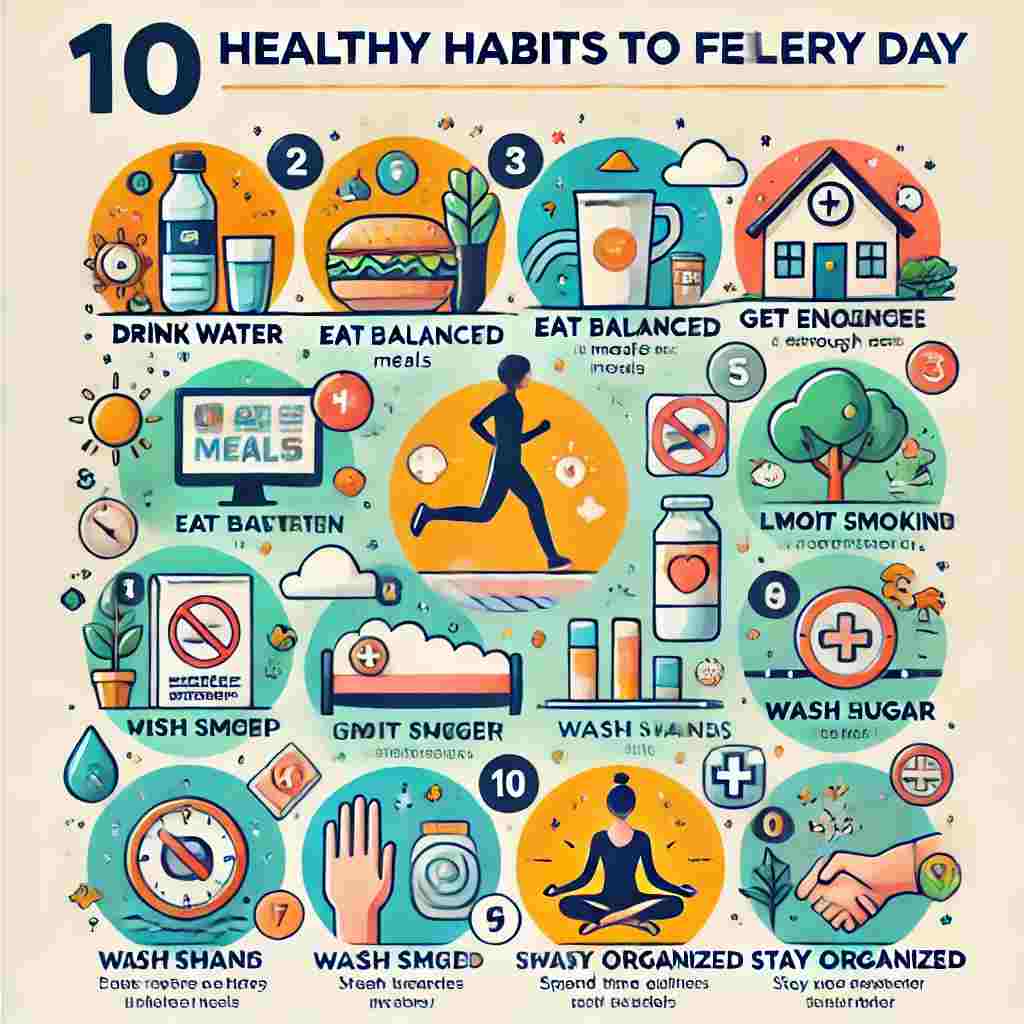10 Healthy Habits

10 Healthy Habits to Follow Every Day
Maintaining good health isn't just about occasional efforts; it's about consistently adopting healthy habits into your daily routine. Here are ten essential habits to incorporate into your everyday life for a healthier, happier you.
Introduction
In our fast-paced lives, it's easy to neglect our health amidst various commitments. However, prioritizing health should be non-negotiable. By embracing simple yet effective habits daily, you can enhance your overall well-being and quality of life.
1. Eating Nutrient-Rich Foods
Importance of a Balanced Diet
A balanced diet is the cornerstone of good health. It should include a variety of nutrient-rich foods such as fruits, vegetables, lean proteins, and whole grains. These provide essential vitamins, minerals, and antioxidants necessary for optimal bodily function.
Incorporating Fruits and Vegetables
Fruits and vegetables are packed with vitamins, minerals, and fiber. Aim to fill half your plate with these colorful gems at every meal to support digestion, boost immunity, and reduce the risk of chronic diseases.
Lean Proteins and Whole Grains
Lean proteins like chicken, fish, beans, and tofu are vital for muscle repair and growth. Pair them with whole grains like quinoa, brown rice, or oats to provide sustained energy and keep you feeling full and satisfied.
2. Staying Hydrated
Benefits of Proper Hydration
Water is essential for almost every bodily function, from regulating body temperature to flushing out toxins. Adequate hydration improves digestion, cognitive function, and skin health while reducing the risk of headaches and fatigue.
Tips for Increasing Water Intake
Carry a reusable water bottle with you throughout the day as a reminder to drink more water. Flavor your water with fresh fruits or herbs for added taste and hydration. Aim to drink at least eight glasses of water a day, more if you're active or in hot weather.
Signs of Dehydration
Dehydration can manifest as thirst, dry mouth, dark urine, fatigue, and dizziness. If you experience any of these symptoms, reach for a glass of water immediately to rehydrate your body.
3. Regular Exercise
Importance of Physical Activity
Regular exercise is crucial for maintaining a healthy weight, improving cardiovascular health, and boosting mood and energy levels. Aim for at least 30 minutes of moderate-intensity exercise most days of the week, such as brisk walking, cycling, or dancing.
Simple Ways to Stay Active
Incorporate physical activity into your daily routine by taking the stairs instead of the elevator, walking or biking to work, or scheduling regular workout sessions with a friend. Choose activities you enjoy to make exercise feel less like a chore and more like a reward.
Finding Enjoyable Activities
Experiment with different types of exercise until you find what you love. Whether it's hiking, swimming, yoga, or dancing, the key is to find activities that you look forward to and that bring you joy.
4. Prioritizing Sleep
Impact of Sleep on Health
Quality sleep is essential for overall health and well-being. It allows your body to repair and regenerate, supports immune function, and enhances cognitive function and mood regulation.
Strategies for Better Sleep
Establish a relaxing bedtime routine to signal to your body that it's time to wind down. Create a comfortable sleep environment that is dark, quiet, and cool, and limit screen time before bed to avoid disruptions to your sleep cycle.
Common Sleep Disorders
If you consistently have trouble falling or staying asleep, you may have a sleep disorder such as insomnia or sleep apnea. Consult a healthcare professional if sleep issues persist to address underlying causes and improve sleep quality.
5. Managing Stress
Effects of Chronic Stress
Chronic stress can take a toll on your physical and mental health, contributing to a range of conditions including anxiety, depression, and heart disease. Learning to manage stress is essential for overall well-being.
6. Mindful Eating
Cultivating a Healthy Relationship with Food Mindful eating involves paying attention to your food choices and eating habits without judgment.Developing a healthier relationship with food improves your overall eating experience.
Benefits of Mindful Eating
Mindful eating can help you make healthier food choices, prevent overeating, and enjoy your meals more fully. By cultivating a mindful approach to eating, you can improve digestion, reduce stress around food, and enhance overall well-being. 7. Finding Balance Importance of Balance in Life Finding balance involves prioritizing your physical, emotional, and mental well-being in all areas of life. It means setting boundaries, managing commitments, and making time for activities that replenish and energize you. Setting Realistic Goals Set goals that are realistic and reflect what is important to you. Divide bigger goals into smaller, achievable tasks, and be sure to acknowledge your accomplishments as you make progress. Remember that balance is dynamic and requires ongoing adjustment. Embracing Imperfection Accept that life is unpredictable and that setbacks are inevitable. Embrace imperfection and learn from your experiences, using them as opportunities for growth and self-discovery. Cultivate self-compassion and treat yourself with kindness and understanding. 8. Celebrating Progress Acknowledging Small Victories Celebrate your achievements, no matter how small. Recognize your efforts and progress, and give yourself credit for the steps you've taken towards better health and well-being. Final Thoughts Incorporating these ten healthy habits into your daily life can have a profound impact on your overall health and well-being. By nourishing your body with nutrient-rich foods, staying hydrated, exercising regularly, prioritizing sleep, managing stress, maintaining social connections, seeking preventive healthcare, practicing mindful eating, finding balance, and celebrating progress, you can create a foundation for a healthier, happier life.